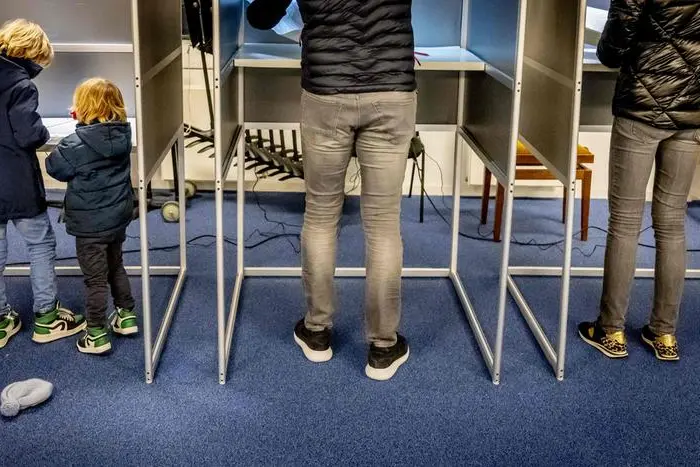PHOTO
Dutch voters cast ballots Wednesday in an unpredictable election that will usher in a new political era after Prime Minister Mark Rutte's record 13-year stint in charge.
Opinion polls suggest the result is far too close to predict, with any of four candidates -- including one from the far-right -- within striking distance of power in the EU's fifth-largest economy.
The vote is being closely watched across Europe and further afield: the Netherlands tends to punch above its weight in the EU and on the world stage, with steadfast support for Ukraine and eurozone fiscal discipline.
Polls suggested huge numbers were undecided going into election day, making the result a literal coin-toss for one voter.
"For me, this is a bit of a different election because anyone can win. In the end it came down to two candidates. I tossed a coin and chose one," Vincent Spijker, a 54-year-old quality control manager told AFP after casting his vote.
Curbing immigration, solving a crippling housing shortage that especially affects Dutch youth, and the cost-of-living crisis have dominated the campaign. The war in Gaza and climate change have received less focus.
Whoever comes out top will face a long struggle to form a workable coalition, a process that will likely last well into next year. The last Rutte government took 271 days to be formed.
'In the freezer'
Could the Netherlands elect its first woman prime minister? Dilan Yesilgoz, leader of the centre-right VVD party and successor to Rutte, is hoping to cap a meteoric career by clinching the top job.
Born in Turkey, the charismatic 46-year-old has taken a hard line on immigration, pledging to drive down refugee numbers -- a paradox to many as she arrived as a young girl following her asylum-seeking father.
Hard-working and media-savvy with a strong Instagram presence, Yesilgoz shrugs off the fact she would make history as the first woman PM, but told AFP at a recent rally: "It's about time."
Yesilgoz immediately raised eyebrows by declaring a willingness to welcome anti-Islam firebrand Geert Wilders into a VVD-led coalition -- a radical departure from Rutte's policy.
Wilders has toned down some of his more hardline views, even saying there were "bigger problems" than bringing down asylum numbers and that he could put some of his anti-Islam positions "in the freezer".
As prime minister he would govern "for all Dutch people," Wilders insisted during an election-eve debate.
His PVV party carried some momentum into the final days of campaigning, enjoying a big spike in the polls, and he seems likely to play some role in post-election jockeying.
A Wilders win would be a political earthquake felt beyond the Netherlands, but it is unclear who would accept to join a PVV-led coalition, making forming a government tricky.
Pensioner Lyon Kloezeman, 75, told AFP she voted Wilders in the hope he will "stem the flood of asylum-seekers."
"We don't have the money, time or space (for asylum-seekers), and we should look after our own people," Kloezeman said.
'Saint Pieter'
Pieter Omtzigt, a maverick MP and whistleblower, has thrown a massive spanner in the works with the creation of a completely new party, the New Social Contract (NSC).
Dubbed "Saint Pieter" and considered by many a Messiah for his crusade to clean up Dutch politics, he looked the clear favourite at one point.
But his support appeared to have dipped in the final days of the campaign, hampered by uncertainty over whether he actually wanted the top job.
If Yesilgoz, Omtzigt and Wilders are all on the right of the political spectrum, former European Commissioner Frans Timmermans is hoping to build a left-wing wall to keep them at bay.
Architect of the EU's Green Deal, the 62-year-old brings experience, climate credentials and a safe pair of hands to the campaign.
He too saw a jump in support in the final days, with analysts saying left-wing voters were banding together with his Green/Labour party to prevent a right-wing coalition.
In the fragmented Dutch "Polder" political system, no party is likely to win more than 20 percent of the vote, meaning coalition horse-trading begins immediately after the results.
Voting closes at 9:00 pm (2000 GMT) when exit polls are published. Turnout is usually relatively high above 70 percent.
Until then, the suspense is total. "Anyone who knows who is going to win this election is lying through their teeth," political analyst Julia Wouters told AFP.
"Anything and everything can still happen."





















